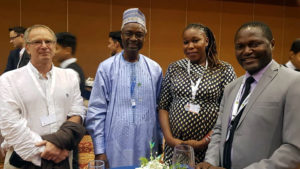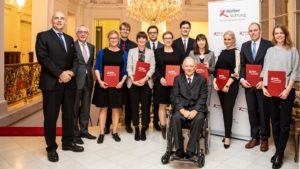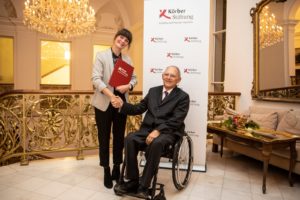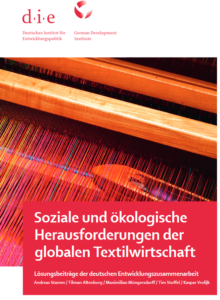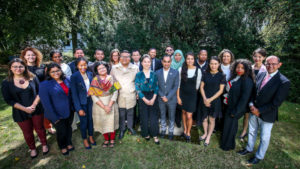TEG-CRM Meeting
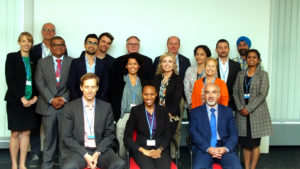
On 29-30 August, DIE hosted the First Meeting of the Technical Expert Group on Comprehensive Risk Management (TEG-CRM) organized by the Executive Committee of the Warsaw International Mechanism for Loss and Damage (WIM ExCom). The meeting was a unique opportunity for a strategic engagement of diverse research and development organizations in the WIM process. The event served as a platform for developing a plan of action on comprehensive risk management approaches to advance the implementation of the five-year rolling workplan of WIM ExCom.
This event has been organized with the financial support from the German Federal Ministry for Economic Cooperation and Development (BMZ) through the ‘Klimalog’ project.
2019 UN Climate Action Summit
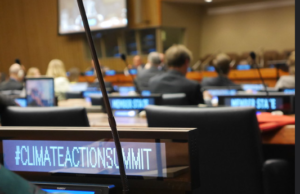
On 23 September, UN Secretary General António Guterres convened the 2019 Climate Action Summit. Government leaders and representatives from youth, business, cities, and finance focused on increasing ambitions to lower greenhouse gas emissions and build climate resilience. In advance of the Summit a whole slew of reports was released, including the report on ‘Global Climate Action from cities, regions and businesses’ by NewClimate Institute, Data-Driven Envirolab, PBL Netherlands Environmental Assessment Agency, the German Development Institute/Deutsches Institut für Entwicklungspolitik (DIE), and Blavatnik School of Government at the University of Oxford. This much-anticipated report estimates the impact of individual actors and cooperative initiatives on global and national emissions. DIE’s Researcher Sander Chan contributed to the analysis of the role of international cooperative initiatives in the report. In the estimation of Sander Chan, despite these striking initiatives and efforts by the Summit organisers to establish stronger links between non-state and local actions, and governments, the Summit has not rallied higher government ambitions. Sander Chan and Gabriela Iacobuta were on site in New York to observe the summit and feed their research findings on mitigation and non-state actors into the debate. This report and other reports show a widening gap between climate goals and governmental commitments to action, as well as the growing impacts of climate change. However, few of the gathered world leaders raised their climate ambitions.
The Summit saw the launch of 28 collaborative initiatives across nine thematic areas, including climate finance, industry transition, mitigation, resilience and adaptation, and nature-based solutions. Eye-catching initiatives include the Asset Owner Alliance, a new coalition of pension funds and insurers that manages over US$2.3 trillion. The Alliance aims to shift investments away from carbon intensive industries with the goal to limit the increase in average temperatures to 1.5°C. Alliance members engage with high-carbon companies to help them adopt sustainable business practices, while divestment from highly polluting industries is on the table as a measure of last resort. To catalyse its impact, the Alliance calls on other large asset owners and sovereign wealth funds to join and align their investment portfolios. In another large initiative, the Bill and Melinda Gates Foundation, along with the World Bank, the European Commission, Sweden, the Netherlands, Switzerland, and Germany, made a US$790 million commitment to support research and innovations that help to improve livelihoods of smallholder farmers facing climate change impacts.
Regrettably, despite these striking initiatives and efforts by the Summit organisers to establish stronger links between non-state and local actions, and governments, the Summit has not rallied higher government ambitions. Some countries (South Korea, the UK, Germany and France) have pledged to double their contributions to the Green Climate Fund and other climate financing programs. However, none of the major economies has acted on the call to raise their targets. Governments will get another chance to raise their pledges at the UN Climate Change Conference in Santiago, Chile, later this year. The time for credible climate commitments by governments is running out, and their inaction is increasingly incurring the wrath of a growing movement of concerned youth, as well as older generations.
Several DIE researchers were on site in New York to observe the summit and feed their research findings into the debate.
NDC Explorer: New data on commitments by fossil fuel producers
Research demonstrates that the majority of the known fossil fuel reserves need to stay in the ground if we want to prevent global warming of 2°C above preindustrial levels. The NDC Explorer, an online tool to analyse and compare countries‘ (Intended) Nationally Determined Contributions (INDCs/NDCs), has added a new subcategory visualising which countries mention fossil fuel production in their NDCs.
“Great that so many countries set targets for emission reduction and renewable energy production in their NDCs,“ Pieter Pauw, Associate Researcher at the German Development Institute / Deutsches Institut für Entwicklungspolitik (DIE) and initiator of the NDC Explorer, confirms. “But they should also explain better in future NDCs what measures they are taking to keep fossil fuels in the ground.”
The new data collected by Cleo Verkuijl, Natalie Jones and Michael Lazarus from the Stockholm Environment Institute (SEI) therefore enriches existing insights from the NDC Explorer, and shows the potential for raising ambitions through national commitments on fossil fuel reserves. Data on countries‘ fossil fuel production was obtained from the International Energy Agency World Energy Balances (Edition 2018), which considers country data for 2016.
The NDC Explorer is solely based on information communicated by Parties to the UNFCCC in their INDCs/NDCs. The dataset was jointly established by the German Development Institute / Deutsches Institut für Entwicklungspolitik (DIE), the African Centre for Technology Studies (ACTS) and the Stockholm Environment Institute (SEI) in cooperation with the UNFCCC secretariat. The Frankfurt School – UNEP Collaborating Centre for Climate & Sustainable Energy Finance joined the consortium in 2018.
Analyse and compare what countries say about fossil fuel production in their (I)NDCs.

